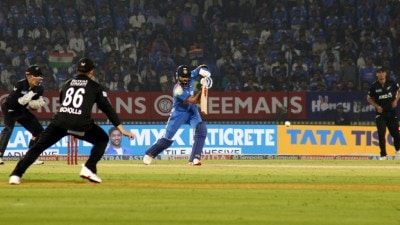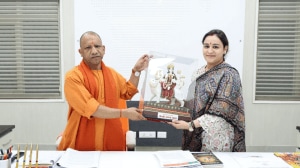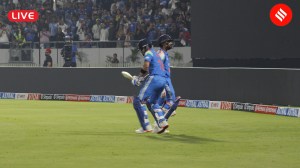Let146;s not talk on the field
Off the field Indians can8217;t eyeball opponents for long, there are so few of us playing cricket.

And so, inevitably, the tour moves on. It had to. The world of cricket is too small for the best and the richest to eyeball each other for too long. It is not over yet but everybody has an opportunity to take a backward step, so underrated and so crucial in a standoff. Cricket is, effectively, an eight-country sport, a small family, and there is no alternative to living together. Like good arranged marriages, we will have to swallow the odd moment of discontent, take sides and draw comparisons, but a divorce is not an option.
There were no more than three issues in this hullabaloo. The umpiring set the tone; and really, there is little anyone can do about it other than to intensify the search for the best and have stringent reviews. By the end of the match they, Mark Benson in particular, looked rattled. He took the fielder8217;s word since there had been an agreement to that effect when, in hindsight, he could have followed his own instincts, given the volatility of the situation. And sadly, Steve Bucknor had to go. The moment comes for everyone, as it will for you and me.
The second issue was the spirit of the game, a much disguised entity whom no one really recognises. I suspect the Australians have been forced, for corporate reasons, to take the moral high ground. But their players are not equipped to follow it at all times. It is difficult, in the heat of battle, to remember a mission statement and pull-back. And so, I believe, they are confused and nowhere is the confusion more manifest than in the statements they think they should make; or maybe are trained to make. Player after player, including the short-tempered captain, said they did nothing that violated the spirit of the game and continued making claims of integrity. And some were forced to say that integrity means different things when batting and when fielding. So, it is alright to stand and wait for the umpire8217;s decision when you know you are out but you should still be trusted to speak the truth with catches. In fact, trust is becoming too much of a burden to carry, for it cannot be interpreted conveniently.
The old Australian system was easier for the players to follow. We do our job and the umpire does his, they said; and while it did not always look good, it was consistent. Now with many stakeholders in the game, they are having to posture, to say the right things, to seek the moral high ground. It was always going to be naive to expect a fielder8217;s word to be taken, for they do not have a tradition in that area. Even the mighty Steve Waugh claimed a bump ball in the West Indies and certainly it would be ridiculous to take Ponting8217;s word. Even Gilchrist, who walks, feels the need to appeal when a player is clearly not out. Now, everyone does that, the Indians did too, but the problem lies in claiming the moral high ground. Rarely has it been more slippery.
So too, it is felt that it is fine to be abusive, often on deeply personal issues, but not fine to be racist. Neither should be allowed but you cannot have a situation where it is okay to appear wounded on one count and be completely over the top on another. When the English left after the Ashes, some of them were in shock at the intensity of personal abuse. Sadly, there is now only one way out and that is to ban chatter completely. Cricketers might scoff at this suggestion but they have lost the right to live any other way. And with all the debate over the usage of the word 8216;monkey8217;, the definition of what is offensive and what isn8217;t will become impossible to recognise. Anil Kumble thinks the word 8216;bastard8217; is offensive, and it is, but a group of lads in a bar might freely use it and wonder what the fuss is all about. What is acceptable in one culture may not be in another. So, I8217;m afraid, no chatter. And that might just be the best thing to happen to the game. A lot of great players didn8217;t need to use their lips and the game will lose nothing.
The third issue is the judgment of the match referee. And this is where the ICC have a major decision to take. It is generally felt that the referee8217;s job is a good retirement posting. You continue to meet old friends, fly the world and watch cricket and don8217;t really do anything. And sadly, cricketing stature has often been equated with being worldly-wise and intelligent. Most cricketers are good at hurling a ball and belting it. They may have many other skills, but to assume that they do is dangerous and, indeed, we often expect too much from our cricketers, expecting them to have a considered point of view on most matters. Indeed, few have exposure to other facets of life and certainly very few are equipped to handle a volatile, near-legal hearing. A lawyer can8217;t bat and a cricketer cannot interpret law unless they have been trained in both professions. And so, a confused Mike Procter ends up accepting one man8217;s word over another. Unless that is swiftly squashed, the game will be mired in petty squabbles over whose word to accept. So far only mothers have been able to figure that out.
Now Procter has no option but to hand Brad Hogg a three game ban, and at this rate there will be more three game bans than traffic violations. Cricket will become impossible to police, and we will all spend more time playing us and them rather than enjoying a beautiful sport.
Cricket has no option but to ban chatter completely and who knows, in doing so, it might become the hard and pleasant game that all of us seek it to be.
The writer is a cricket commentator
editorexpressindia.com
- 01
- 02
- 03
- 04
- 05































